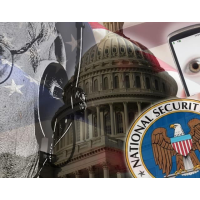Congress Wants to Know Why NSA Spied on Israeli Prime Minister’s Conversations with U.S. Lawmakers
 (graphic: Yahoo News; photos: AP, Getty Images)
(graphic: Yahoo News; photos: AP, Getty Images)
By Erica Werner, AP Congressional Correspondent
WASHINGTON (AP) — The chairman of the House Intelligence Committee said Wednesday his committee will look into a report the U.S. spied on the Israeli prime minister and in the process swept up communications with Congress.
Republican Rep. Devin Nunes of California told The Associated Press that he's asked the director of National Intelligence and the head of the National Security Agency to come to Capitol Hill next week to brief lawmakers on the matter.
A report in The Wall Street Journal said that even after President Barack Obama announced two years ago he would limit spying on friendly heads of state, the NSA kept watch on Israeli Prime Minister Benjamin Netanyahu and top Israeli officials.
In the process the agency caught some conversations with U.S. lawmakers, according to the report.
That's something that would typically be reported to top congressional leaders and the heads of the House and Senate Intelligence committees, but Nunes said he recalled receiving no such notification.
He said his goal would be to "get the facts" about the situation.
"We're going to play this right down the middle and determine whether or not somebody did something wrong," Nunes said by phone from California.
Later Wednesday, the chairmen of the House Oversight Committee and its national security subcommittee sent a letter to NSA Director Michael Rogers requesting documents and a briefing about the process.
Reps. Jason Chaffetz, R-Utah, and Ron DeSantis, R-Fla., wrote that the Journal report raises "questions concerning the processes NSA employees follow in determining whether intercepted communications involved members of Congress, and the latitude agency employees have in screening communications with members of Congress for further dissemination within the Executive Branch."
According to the Journal report, some of the exchanges in question involved Israeli strategy around the Iran nuclear deal that Netanyahu ardently opposed, as did congressional Republicans. In some cases the NSA overheard Israeli officials trying to convince undecided lawmakers to oppose the deal, which Congress ultimately failed to block.
The White House declined to comment on specific intelligence activities carried out by the U.S. But White House officials said the U.S. doesn't spy overseas unless there's a specific, validated national security reason to do so, emphasizing that the principle applies both to world leaders and regular citizens.
The U.S. intelligence community kept the relevant oversight committees in Congress fully informed about its activities, officials said.
And aiming to show that the security relationship between the U.S. and Israel remained unharmed, officials noted that a U.S. team had traveled to Israel this month to resume talks toward a new 10-year agreement on U.S. military aid.
"When it comes to Israel, President Obama has said repeatedly that the U.S. commitment to Israel's security is sacrosanct," said Ned Price, a spokesman for the White House's National Security Council. "This message has always been backed by concrete actions."
___
Associated Press writer Josh Lederman contributed.
- Top Stories
- Unusual News
- Where is the Money Going?
- Controversies
- U.S. and the World
- Appointments and Resignations
- Latest News
- Musk and Trump Fire Members of Congress
- Trump Calls for Violent Street Demonstrations Against Himself
- Trump Changes Name of Republican Party
- The 2024 Election By the Numbers
- Bashar al-Assad—The Fall of a Rabid AntiSemite






Comments